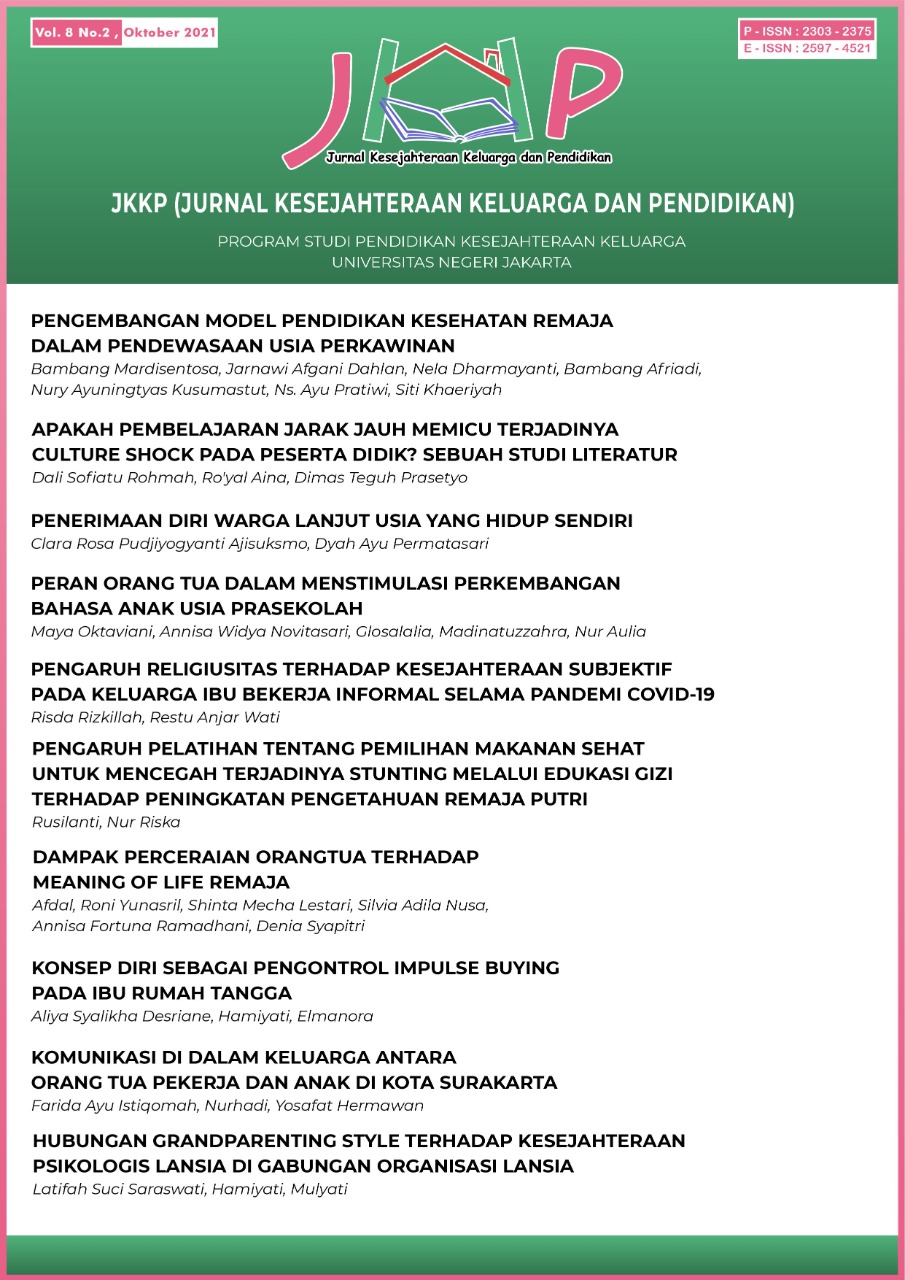PENGEMBANGAN MODEL PENDIDIKAN KESEHATAN REMAJA DALAM PENDEWASAAN USIA PERKAWINAN
Mengukur Batasan Usia Sisi Kesehatan dan Emosional untuk Berkeluarga
DOI:
https://doi.org/10.21009/JKKP.082.01Keywords:
development model, family readiness, reproductive health education, teenagerAbstract
This research aims to develop a model instrument for adolescent health education in maturing the age of marriage. At adolescence, the female reproductive organs are psychologically well developed and strong and ready to give birth to offspring and physically begin to mature. For that, it needs a method of health education that can reach teenagers. This research used a development method that also includes the instrument standardization process. The model used is a 4-D model development consisting of define, design, develop, and disseminate. The subjects of this study consisted of adolescents aged 10-15 years and 16-21 years in Tangerang City. The sample was selected in this study through cluster random sampling technique. This study indicates that reproductive health education can increase the knowledge of adolescents in Tangerang City about maturing the age of marriage. Health education activities through reproductive education have shown quite effective results in increasing adolescent knowledge about maturing age at marriage. At the pretest, adolescents' knowledge was included in the poor category because the teenagers had not received direct information about maturing age at marriage. However, indirectly some teenagers get information from the mass media without further knowledge, namely at the knowing stage. However, during the posttest, there was a significant increase in respondents' knowledge about reproductive health education. Of the 13 indicators, all experienced an increase in the average value of knowledge compared to the reproductive health education pretest.
Abstrak
Penelitian ini bertujuan untuk mengembangkan instrumen model pendidikan kesehatan remaja dalam pendewasaan usia perkawinan. Pada usia remaja tersebut, organ reproduksi perempuan secara psikologis sudah berkembang dengan baik dan kuat serta siap untuk melahirkan keturunan dan secara fisik pun mulai matang. Untuk itu diperlukan suatu metode pendidikan kesehatan yang dapat menjangkau para remaja. Penelitian ini merupakan penelitian pengembangan yang juga meliputi proses pembakuan instrumen. Model yang digunakan adalah pengembangan model 4-D yang terdiri dari define (pendefinisian), design (perancangan), develop (pengembangan), dan disseminate (penyebaran). Subjek penelitian ini terdiri dari remaja berusia 10 – 15 tahun dan 16 – 21 tahun di Kota Tangerang. Sampel dipilih pada penelitian ini melalui teknik cluster random sampling. Hasil penelitian ini menunjukkan bahwa pendidikan kesehatan reproduksi dapat meningkatkan pengetahuan remaja di Kota Tangerang tentang pendewasaan usia perkawinan. Kegiatan pendidikan kesehatan melalui pendidikan reproduksi menunjukkan hasil yang cukup efektif untuk meningkatkan pengetahuan remaja tentang pendewasaan usia perkawinan. Pada saat pretest, pengetahuan remaja termasuk dalam kategori kurang karena belum mendapatkan informasi secara langsung mengenai pendewasaan usia perkawinan. Akan tetapi secara tidak langsung beberapa remaja mendapatkan informasi dari media massa tanpa pengetahuan lebih lanjut yakni pada tahap tahu. Namun, saat posttest, terjadi peningkatan yang signifikan pada pengetahuan responden mengenai pendidikan kesehatan reproduksi. Dari 13 indikator, semuanya mengalami peningkatan nilai rata-rata pengetahuan dibandingkan saat pretest pendidikan kesehatan reproduksi.
Downloads
Published
Issue
Section
License
Authors who publish with this Journal agree to the following terms:
- Author retain copyright and grant the journal right of first publication with the work simultaneously licensed under a creative commons attribution licensethat allow others to share the work within an acknowledgement of the work’s authorship and initial publication of this journal.
- Authors are able to enter into separate, additional contractual arrangementfor the non-exclusive distribution of the journal’s published version of the work (e.g. acknowledgement of its initial publication in this journal).
- Authors are permitted and encouraged to post their work online(e.g. in institutional repositories or on their websites) prior to and during the submission process, as it can lead to productive exchanges, as well as earlier and greater citation of published works.
Users/public use of this website will be licensed to CC BY SA
![]()







